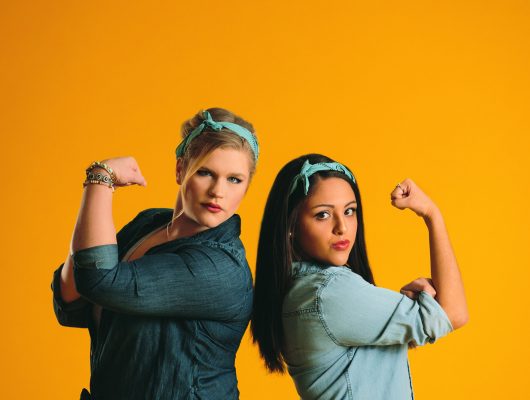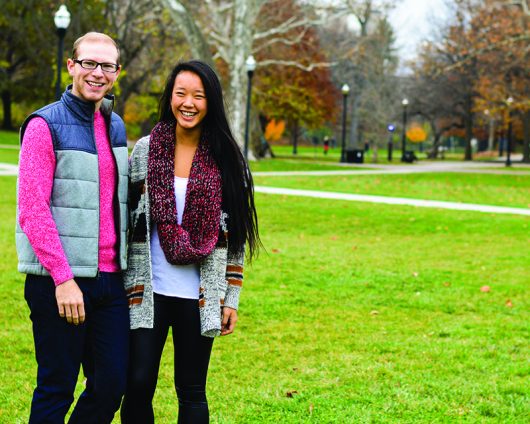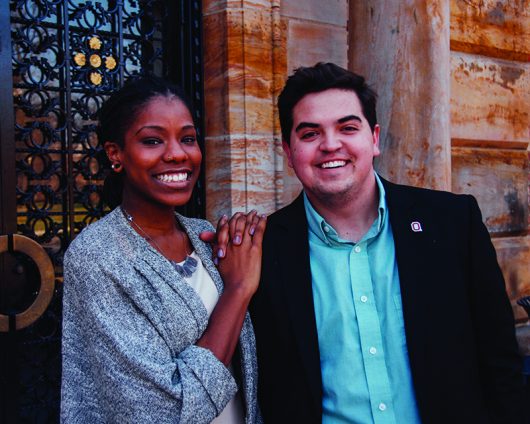The Undergraduate Student Government’s campaign season for the 2017-18 school year officially kicked off Wednesday night at 8 p.m., with four presidential campaigns on the ballot. Campaign season will last two weeks, with the voting opening on March 6 at noon and closing on March 8 at 11:59 p.m.
The Lantern profiled the four presidential campaigns, which offer platforms emphasizing ideas ranging from diversity to reducing USG’s funding.
Reagan Brooks & Reese Brooks

Reagan and Reese Brooks are running for Undergraduate Student Government president and vice president, respectively. Credit: Courtesy of Reagan and Reese Brooks
Since transferring to OSU in the fall, twin brothers Reagan Brooks and Reese Brooks, both third-years in marketing, have joined three organizations and founded their own. Now, they said they have set their sights on USG, launching an outsider presidential campaign with a focus on providing more funding to student organizations, while cutting funding to USG itself.
“A decrease to funding for USG is a big (platform) that we’re going to run on, because they get hundreds and thousands of dollars of funding, most of which the students don’t really see back,” said Reagan Brooks, the presidential candidate.
Neither of the brothers are members of USG, a point which they see as an asset to their campaign.
“Not having a vested role in USG, we can come in, ideally, as presidents with sort of a clear vision being club presidents ourselves and not being influenced by a lot of the bureaucracy that’s involved in USG, and sort of use our experience in organization building to better represent the students on campus,” said Reese Brooks, the vice-presidential candidate.
Reese Brooks said that the idea for running came after examining the other potential candidates and their proposed policies.
“We sort of knew who was going to run for USG president, we spoke with them, we looked at the potential policies that they might have when they were official candidates, and we weren’t necessarily a huge fan of some of the stuff they were proposing. So we sort of put together our own campaign,” Reese Brooks said. “Since we didn’t like the other campaigns, we thought we might as well run our own.”
As co-founders of the libertarian student organization Students for Liberty, the duo said their administration would have a heavy focus on student life over bureaucracy, something they said they feel is not currently prioritized within USG.
“We’re really running that outsider position,” Reagan Brooks said. “We’re not here to just go to the weekly USG meetings and play politics, we’re here to actually represent the people of OSU and the clubs of OSU. This outsider mindset is something we think is going to be very effective.”
Reese Brooks said his and his brother’s outsider status reflects the current political climate for politicians who are not a part of the two major political parties.
“The political landscape, if you look both nationally and internationally, 2016 is the year of outsiders. You saw that on both the left and the right,” Reese Brooks said. “You get a lot of these outsiders coming in and trying to make actual change, because people are sort of fed up with the political environment and we’re sort of just building off that.”
Mary Honaker and Carla Gracia

Mary Honaker and Carla Gracia are running for Undergraduate Student Government president and vice president, respectively. Credit: Courtesy of Mary Honaker and Carla Gracia
Presidential candidate Mary Honaker, a third-year in international studies, and vice-presidential candidate Carla Gracia, a second-year in political science, are campaigning on diversity, inclusion and college affordability.
“Our most attractive policy point is we want to expand a program that was started at University of Southern California to Ohio State,” Honaker said. “Every time Student Safety Service’s Safe Rides went over 15 minutes on weekend nights, it would send students to a ridesharing app and students would get free rides from 9 p.m. to 3 a.m., Thursday, Friday and Saturday nights within three miles of campus.”
Honaker and Gracia said they see weaknesses on campus that they feel they can address.
“I think textbooks. (The current USG administration) did promise a lot of textbook stuff — I think they’re doing a really great job, but I think that’s one that hits home,” Gracia said. “I think paying $600 a semester in textbooks is kind of ridiculous. That’s one of our biggest points, open-source textbooks, and making college more affordable for everyone.”
The running mates also said they see the need for improvements in off-campus medical care options, going as far as recommending a new facility.
“Another big policy point for us is we want an off-campus medical center in the new construction on High Street,” Honaker said. “That way, on High Street, there is just a version of the Wilce, even smaller than that. In case you’re sick, and you live on Summit or farther, you can go there instead of having to go on campus, because that’s a hike.”
Honaker also said they have plans for reviewing university investments.
“The ballot initiative, divest. Our campaign definitely falls on the pro-Israel side, but we have this policy point, it’s another big one that we want an investment review board for humane and ethical standards,” Honaker said. “We want the university to lay out all of the university investments, and we would want to review all of our investments to make sure everything is ethical and everything is humane.”
Andrew Jackson and Sophie Chang

Andrew Jackson and Sophie Chang are running for Undergraduate Student Government president and vice president, respectively. Credit: Courtesy of Andrew Jackson and Sophie Chang
Presidential candidate Andrew Jackson, a third-year in Spanish and political science, and vice-presidential candidate Sophie Chang, a third-year in environment, economy, development and sustainability, have organized their platform with an emphasis on affordability, inclusion and sustainability.
“We’ve always been trying to advocate for students, for students who don’t have as much access to certain things on campus, so our aim at this point is to work for and with the students,” Chang said.
As far as finances, Jackson and Chang said they want the continuation of steps taken by USG’s current administration toward textbook affordability.
“In terms of textbook affordability, we have made great strides this year and, next year, we want to continue lobbying administrators pretty much, because USG is inherently a lobbying organization,” Chang said. “We want to continue lobbying administrators to offer low- or no-cost textbooks to students or to increase and expand resources within OSU libraries.”
Jackson and Chang said that, as members of the Diversity and Inclusion Committee, the issue of inclusion is one they have worked with in the past and is a vital component of their platform. They said they intend to continue outreach to student organizations, which began this year, in order to further diversify USG’s demographics.
“We’ve had one of our most diverse classes in USG history, and part of that is we are reaching out to more students organizations, student organizations who wouldn’t normally have a voice in USG, because of that we’ve gotten a lot of students who wouldn’t normally be in USG,” Jackson said.
As for sustainability, Chang said they intend to increase off-campus access to recycling, provide more information about what can be recycled and work with University Dining Services to utilize more locally grown food.
“Sustainability, that’s my major,” she said. “It’s something that I feel encompasses everything at Ohio State pretty much because it involves optimizing a system over time and that’s something that has to be applied socially, environmentally and economically.”
The duo added that if elected they intend to continue much of the work of the previous administration.
“We’ve made a lot of good progress this year, and the thing with USG is that USG administrations change year to year. Obviously, the work shouldn’t necessarily change year to year, but the priorities are different,” Chang said. “So, it’s really great when you have a new administration come in and have the same priorities, or have the desire to continue a project.”
Stephen Post and Lauren Todd

Stephen Post and Lauren Todd are running for Undergraduate Student Government president and vice president, respectively. Credit: Courtesy of Stephen Post and Lauren Todd
Presidential candidate Stephen Post, a third-year in economics and political science, and vice presidential candidate Lauren Todd, a fifth-year in English, want USG to be a bigger presence on campus and push USG to have more of an impact on students.
“We want to be something more for the student body,” Post said.
Post, whose campaign came under scrutiny for its fundraising tactics last week, said the running mates have a three-pronged agenda: college affordability, mental health and inclusion.
“We’re looking at 21 credit hours being covered by full tuition, which is in hopes of students graduating in four years and out on time,” he said. “We also want to halt the increase of tuition in certain communities, like the international and out-of-state students.”
Post and Todd also want to strive to make the university a sanctuary campus for the students covered by the Deferred Action for Childhood Arrivals program, an Obama-administration executive order which protects certain undocumented immigrants.
”We believe that we should stand by our peers,” Todd said. “We do think that since we’re all Buckeyes, we do belong here, together. We should support one another in terms of allowing someone to get their education just as much as anybody else.”
Along with the college affordability and inclusion, Post and Todd said they want to add more embedded counselors.
“They would be counselors outside of the Younkin Success Center for students to have access to and avoid the wait times at the Younkin,” Todd said.
Post and Todd have heard the positive impact that embedded counselors have, and hope that increasing the number of them brings similar success. The duo also have plans of their in terms of where embedded counselors would be located on campus.
“We’ve heard from other Big Ten schools that they have been successful,” Post said. “We also want to get them in academic colleges, toward specific communities. If you have an embedded counselor in the College of Engineering, that counselor is going to have more experience than just a regular counselor about the kind of problems that they might deal with.”
Clarification 2/23: This article has been updated with quotes to clarify the stances of Mary Honacker and Carla Gracia on university investments.


